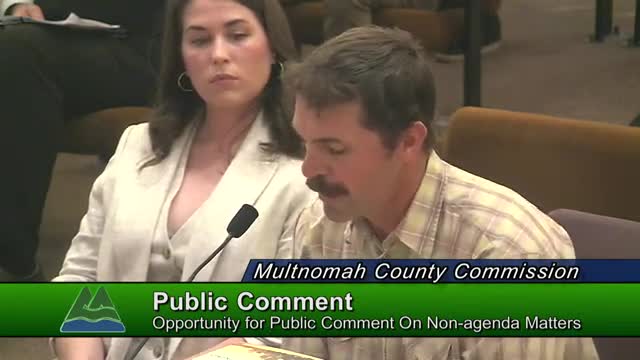Community voices urgent pleas for change and accountability
July 12, 2024 | Multnomah County, Oregon

This article was created by AI summarizing key points discussed. AI makes mistakes, so for full details and context, please refer to the video of the full meeting. Please report any errors so we can fix them. Report an error »

During a recent government meeting, discussions highlighted pressing community issues, including homelessness, public health, and emergency response services.
One speaker emphasized the impact of Sam Quinones' book, \"The Least of Us,\" which explores the complexities of homelessness and drug addiction. The speaker proposed mobile deflection strategies to better engage with individuals experiencing homelessness, suggesting that a more remote location for services could mitigate the negative effects of drug dealers in urban areas. The speaker expressed concern over the current situation, describing it as a \"lose-lose\" for both vulnerable individuals and local businesses, and advocated for a collaborative community approach to provide proper care and support.
Another participant, visibly distressed, shared personal experiences of living with severe health issues and inadequate housing conditions. They criticized the lack of timely assistance and the dire state of their living environment, which has deteriorated due to neglect and health challenges. This testimony underscored the urgent need for improved social services and housing support.
A third speaker raised alarms about emergency medical services, citing personal health risks associated with delayed ambulance responses. They urged commissioners to prioritize public safety over political considerations, emphasizing that timely medical intervention is critical for survival in emergencies.
The meeting also featured comments on local governance and community engagement, with one speaker questioning the absence of library services during a recent holiday and calling for accountability from local officials regarding public resources.
Overall, the meeting reflected a community grappling with significant challenges, from homelessness and health crises to the need for responsive governance, highlighting the importance of addressing these issues collaboratively and effectively.
One speaker emphasized the impact of Sam Quinones' book, \"The Least of Us,\" which explores the complexities of homelessness and drug addiction. The speaker proposed mobile deflection strategies to better engage with individuals experiencing homelessness, suggesting that a more remote location for services could mitigate the negative effects of drug dealers in urban areas. The speaker expressed concern over the current situation, describing it as a \"lose-lose\" for both vulnerable individuals and local businesses, and advocated for a collaborative community approach to provide proper care and support.
Another participant, visibly distressed, shared personal experiences of living with severe health issues and inadequate housing conditions. They criticized the lack of timely assistance and the dire state of their living environment, which has deteriorated due to neglect and health challenges. This testimony underscored the urgent need for improved social services and housing support.
A third speaker raised alarms about emergency medical services, citing personal health risks associated with delayed ambulance responses. They urged commissioners to prioritize public safety over political considerations, emphasizing that timely medical intervention is critical for survival in emergencies.
The meeting also featured comments on local governance and community engagement, with one speaker questioning the absence of library services during a recent holiday and calling for accountability from local officials regarding public resources.
Overall, the meeting reflected a community grappling with significant challenges, from homelessness and health crises to the need for responsive governance, highlighting the importance of addressing these issues collaboratively and effectively.
View full meeting
This article is based on a recent meeting—watch the full video and explore the complete transcript for deeper insights into the discussion.
View full meeting
